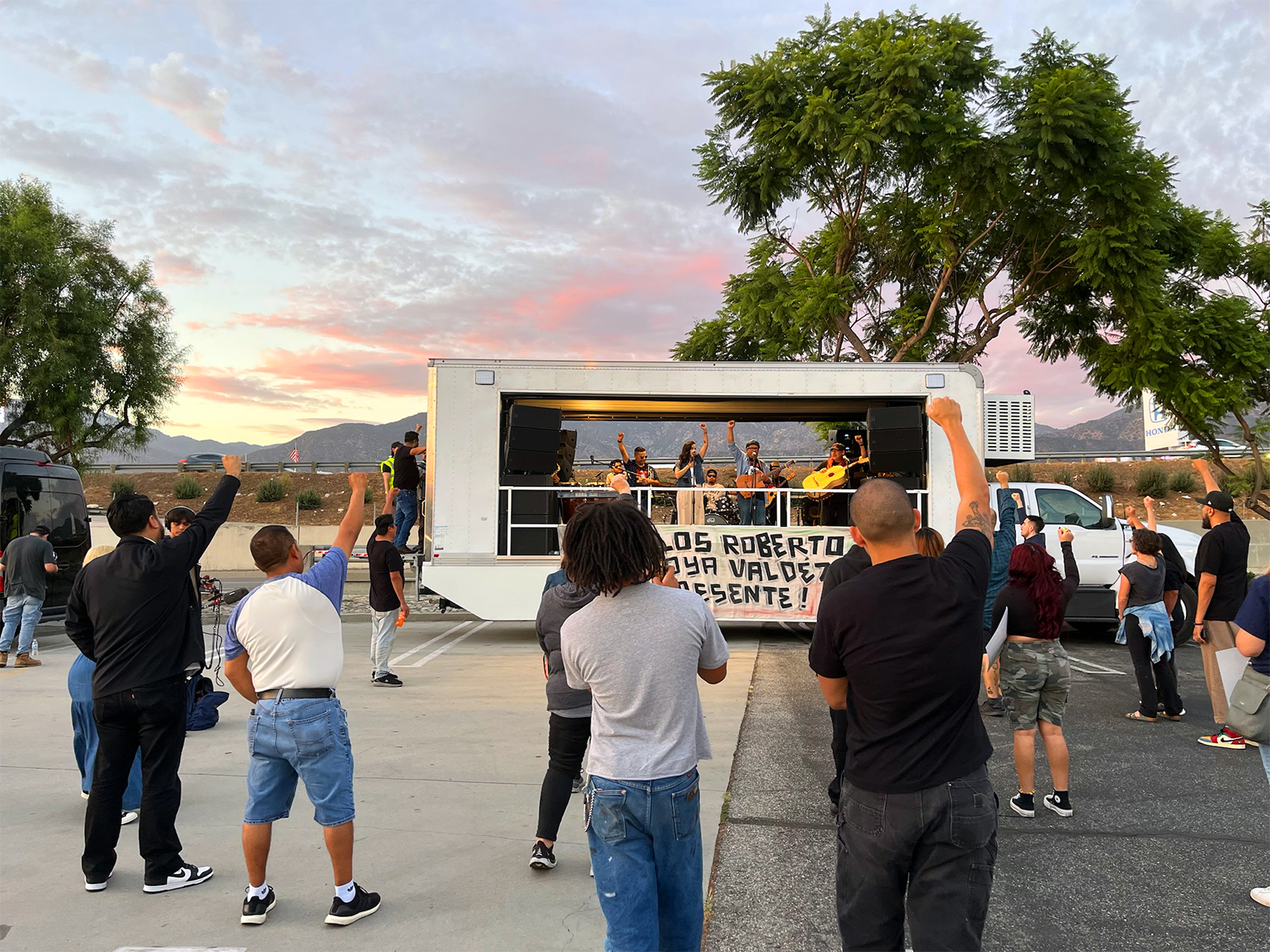
MONROVIA, Calif. (RNS) — In a Home Depot parking lot beside a freeway on-ramp in this city northeast of Los Angeles, a woman sang to a small crowd in Spanish over her band’s rocking cumbia rhythm, “How I love my people, for being more than brave.”
Across the interstate ramp, under peach-colored clouds, a collection of tiny crosses memorialized the spot where Carlos Roberto Montoya Valdez, a day laborer who used to come to the Home Depot to find work, was struck and killed by an SUV as he ran from U.S. Immigration and Customs Enforcement agents.
The crowd had come 40 days after Montoya’s death for an Oct. 10 vigil. Pablo Alvarado, co-executive director of the National Day Laborer Organizing Network, spoke about his childhood memories of the impact of Catholic Archbishop Óscar Romero’s role as the “moral voice” of El Salvador during the country’s military dictatorship and civil war. Romero, who was assassinated while celebrating Mass in 1980, became a Catholic saint in 2018.
Alvarado told the crowd, “I don’t know, but I don’t feel that that person exists in this moment in our country. We don’t have that strong of a moral voice. And we all know what happened to Bishop Romero. And in the absence of an individual like that, then who has to be that moral voice?”
But Christian leaders are working to strengthen this kind of moral voice, using Romero as a model. At Life Pacific University, in San Dimas, the Asociación para la Educación Teológica Hispana (Association for Hispanic Theological Education) was meeting at a preaching and migration conference from Oct. 9 to 11. Alma Tinoco Ruiz, assistant professor of homiletics and evangelism at Duke Divinity School, urged preachers to draw on Romero’s preaching to help their communities navigate trauma.
“What made Romero such a prophetic and pastoral preacher was his ability to clearly hear the voice of God both through Scripture and through the people who suffered and to let both illuminate each other with the light of Christ within them,” Tinoco Ruiz said in her Spanish-language keynote.
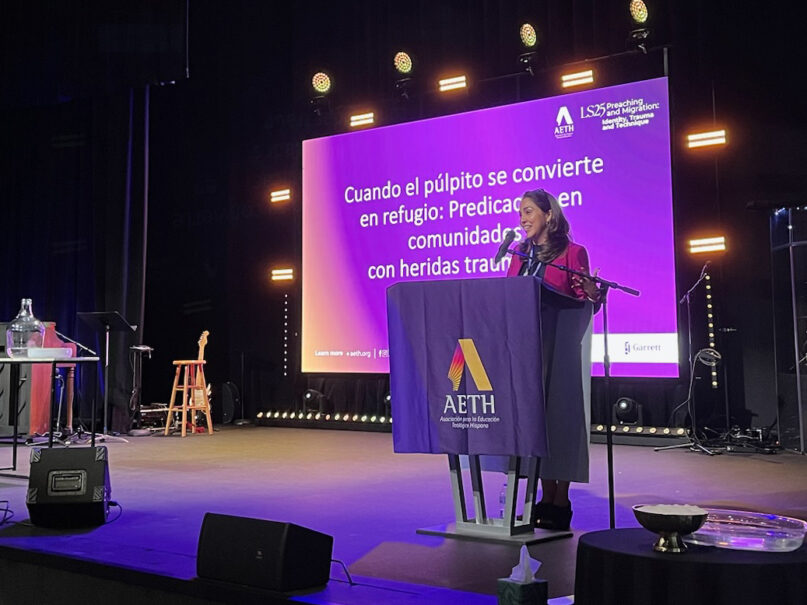
Alma Tinoco Ruiz addresses a meeting of the Asociación para la Educación Teológica Hispana, Oct. 10, 2025, at Life Pacific University in San Dimas, Calif. (RNS photo/Aleja Hertzler-McCain)
The conference often took up the question of how best to preach and pastor congregations traumatized by President Donald Trump’s mass deportation policy. Tinoco Ruiz called on the 250 attendees to be “empathetic witnesses, to speak with tenderness and courage, naming the suffering but also the promises of God.”
In one panel, Harold Segura, director of faith and development for World Vision in Latin America, urged preachers to take into account children who are listening to sermons, saying they can interpret teachings in a very literal way. That preaching can “end up adding more pain” to children’s pre-existing trauma, Segura said.
He advised pastors to spare children violent theologies that depict a punishing God, as they might not know how to make sense of why they are suffering.
Tinoco Ruiz also told her keynote audience that homilies should be instruments of healing, not only for present-day harms but historical wounds from colonization, slavery, natural disasters and human conflict that scientific research says may be passed on genetically to following generations. “Hidden below the resilience, the wounds remain and healing continues to be necessary,” she said, but “the body will pass us the bill.”
She stressed the importance of not giving false promises of instantaneous change from devotion to Christ, as some preachers do, Tinoco Ruiz said. “Healing can take time, and sometimes it requires more than prayer.”
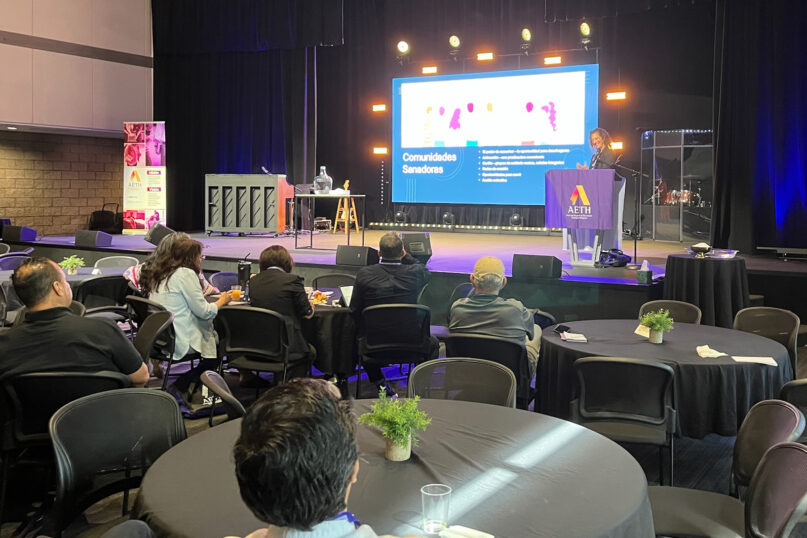
The Rev. Alexia Salvatierra speaks to the Asociación para la Educación Teológica Hispana, Oct. 10, 2025, at Life Pacific University in San Dimas, Calif. (RNS photo/Aleja Hertzler-McCain)
In a workshop on trauma and immigration, the Rev. Alexia Salvatierra, academic dean of Fuller Theological Seminary’s Centro Latino, said acknowledging the trauma of migration is crucial, saying in Spanish, “A lot of the time, undocumented people feel so much shame that they do not bring their migration situations to prayer networks.
“We need to give permission in sermons for them to do that, so that they know that there is no shame in breaking an unjust law,” Salvatierra said. “It is very important to remove the shame and speak about the grace of God. Every person makes mistakes and commits sins.”
Salvatierra advised churches to give threatened immigrants opportunities to participate in collective action and to take on responsibility. “We have to combat the feeling of being without power, without hope, without support. One essential way to combat this is the experience of agency, the experience of being an agent of God.”
An idea of what this may look like was presented at an Oct. 8 meeting of the Los Angeles chapter of the Fraternidad Teológica Latinoamericana (Latin American Theological Fraternity) held at La Fuente Ministries, a bilingual faith community in Pasadena. La Fuente maintains a fund for congregants who have experienced income disruption due to fear of ICE raids and for application fees for congregants working to adjust their immigration status. Church volunteers are also bringing groceries to people who are too afraid to leave their houses, the pastors said.
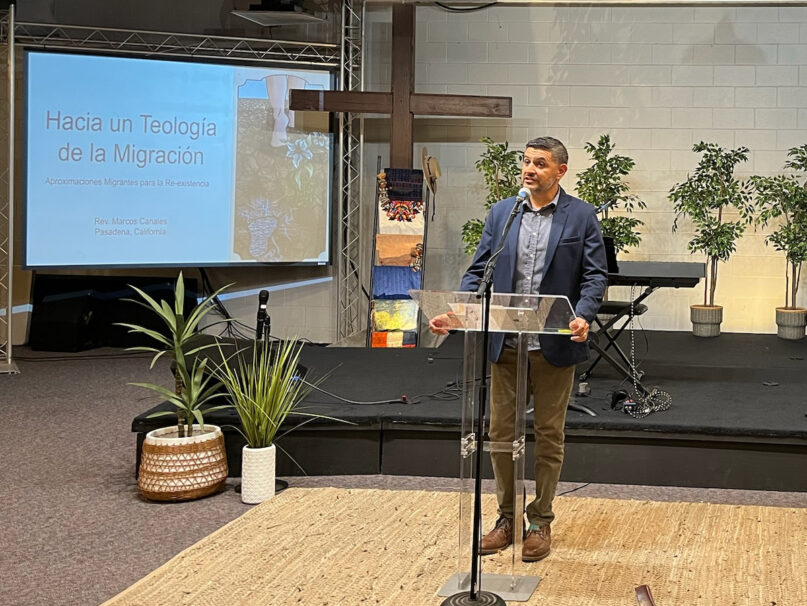
The Rev. Marcos Canales speaks during a meeting of the Los Angeles chapter of the Fraternidad Teológica Latinoamericana at La Fuente Ministries, Oct. 8, 2025, in Pasadena, Calif. (RNS photo/Aleja Hertzler-McCain)
The church has also worked with the Clergy Community Coalition, a local faith-based organization, to plan family preparedness sessions, where families discuss what to do in case of a detention or deportation, and to participate in a rapid response network that addresses ICE activity.
“Our community, La Fuente Ministries, is navigating the devastating season of fire and ICE,” said the Rev. Marcos Canales, the community’s pastor, pointing to three people in the congregation who lost their homes in the Eaton Fire. Many others were evacuated or displaced, said Canales.
The fire, followed by immigration raids, he told Religion News Service, is “a double collective trauma.”
Canales’ wife, Andrea, a clinical psychologist, led the congregation in creating 12 stations of grief in the church, including art projects, a map showing the destruction, candles for community members detained by ICE and white trees where congregants hung white tags with some of their losses of the year.
Canales said that at La Fuente, preaching a theology of migration where “God the migrant relates to the migrant people of God” is an important part of Sunday morning.
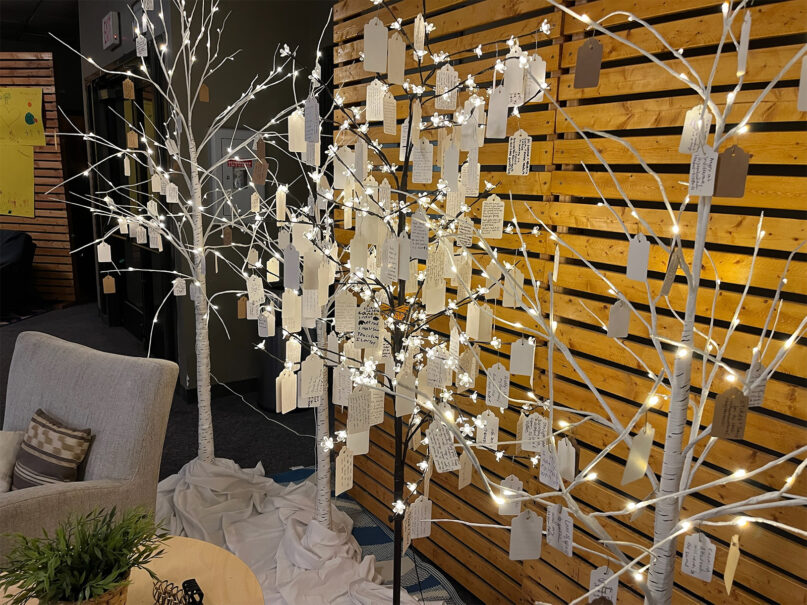
Tags with personal losses are hung from trees in a grief station at La Fuente Ministries, Oct. 8, 2025, in Pasadena, Calif. (RNS photo/Aleja Hertzler-McCain)
In his presentation, Canales, who grew up moving around Latin America with his pastor parents before coming to the U.S. as a student, said migration is part of God’s plan. “The movement of all of the species and of creation itself reveals that it’s a design that responds to the divine law of interdependence and relationality, of communion and liberty,” he said in Spanish.
He also said that maintaining critical memory, which comes from a Biblical tradition, is an opportunity for repentance and drawing closer to God. It’s why he and the Clergy Community Coalition are working together to have a presence at the stream of vigils like the one for Montoya in the Home Depot parking lot.
It’s also why he’s preaching about Latin American history, including “the decades of U.S. intervention in the economies, governments and militarization of the whole continent.”
Canales said in his lecture, “The movement of people isn’t an accident or a misfortune or a crisis. It’s a direct consequence of structural sins rooted in colonialism and extractivism.” Forgetting that history “creates physical and mental walls and borders,” he said.
